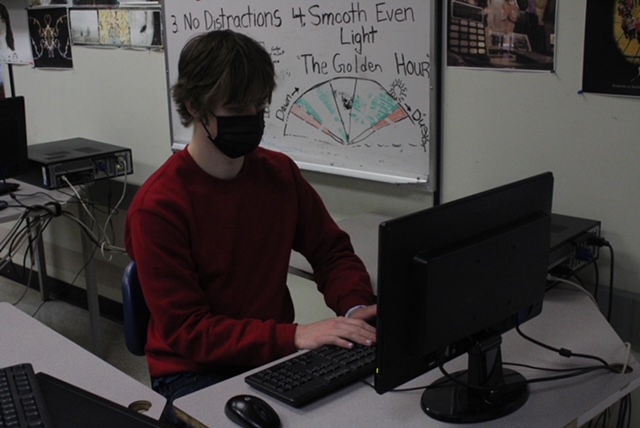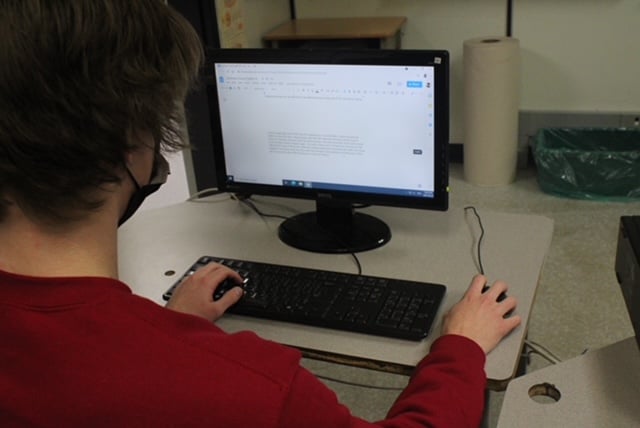When the reality of the COVID-19 pandemic first set in two years ago and Skeena schools announced they were shifting to online learning, Naomi Yuen was initially a bit excited.
“I felt a huge weight lifted off my shoulders,” said Yuen, a grade 11 student at Smithers Secondary School who was relieved that she wouldn’t have to experience all the social pressure that high school brings and can learn in the comfort of her own home.
But it was soon evident to her and many of her peers that learning through a screen would be a challenging experience. Yuen found herself having to navigate textbooks and assignments on her own and having to rely on technology to communicate with her teachers.

“If you have one tiny question that you can’t figure out, it would be a lot easier to ask in- person than it would be to Zoom call or email them and wait for an answer,” she explained.
Chad Bouvier, another student in Yuen’s class, echoed these sentiments and said receiving an email or text was ineffective compared to face-to-face help and support.
“The hardest part was not having easy access to help from teachers,” said Bouvier.
There was also a clear lack of communication between students and teachers. Students needed more direction than they were being given. Teachers struggled to keep up with the flood of questions from struggling kids.
Bouvier also struggled with the technology of online learning because he had no working computer or printer, which in some cases prevented him from accessing his school work.
Many teachers chose to teach with online programs instead of their own lessons and Bouvier could not access those lessons on his phone.
“Eventually the school gave out laptops, but that was about two months after and I was too far behind at that point,” Bouvier said.

When he tried reaching out to tell his teacher he was falling behind because of the technical challenges, his teacher told him the rest of the class had to carry on without him.
“The school didn’t act fast enough for me to be able to catch up and stay with the rest of the class,” Bouvier explained.
The pressure of school and the lack of social interaction with COVID took a serious toll on Bouvier’s mental health too
“I was just in my room alone trying to get work done, it was like homework everyday for months,” he said.
Normally in the classroom other students are there for moral support; friends can provide a distraction or break from the pressure of schoolwork. Amid COVID, there was much less support and interaction from friends and classmates leaving Bouvier feeling distant and lonely.
“My motivation just dropped, especially once I wasn’t able to get in contact with teachers,” he said. “It felt like no one could help and I didn’t even want to be helped anymore.”
Yuen, however, found this affected her differently because she really liked working on her own time. Although she too struggled with motivation, Yuen liked the idea of making her own schedule, with no bells or timetables to follow.
“I didn’t have to get up as early or follow a schedule so my brain worked better and I was more productive,” Yuen said.
The hardest part of school under COVID was that academic classes proved to be more of a struggle than electives. Both Yuen and Bouvier dropped their math classes because the online program the teacher chose was too vague and fast-paced, making that course difficult to understand. English classes, on the other hand, allowed Yuen to have a lot more freedom and she felt challenged and engaged while still learning a lot from her social justice class.
Although Yuen graduated with her class in 2021, she decided to go back and complete the grade 12 math she dropped in the hopes of having more opportunities when she heads to university; her sights are set on business administration at a university in Vancouver.
She still thinks that the school should give more time for online classes in the future, rather than just one semester because in her experience, it takes longer compared to in person learning.
In the future, Bouvier thinks the school should make communicating with students a priority and compensate more quickly for the students that don’t have easy access to the technology needed to succeed.
Bouvier is now redoing his grade 11 and 12 courses in person at Smithers Secondary School, but wishes he could have graduated with his class.
“If COVID didn’t happen I would have graduated and been a lot happier.” he said.




